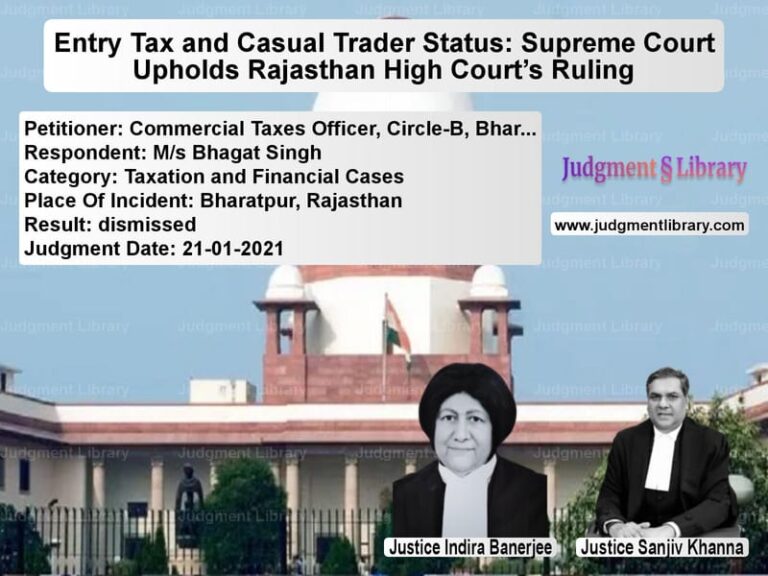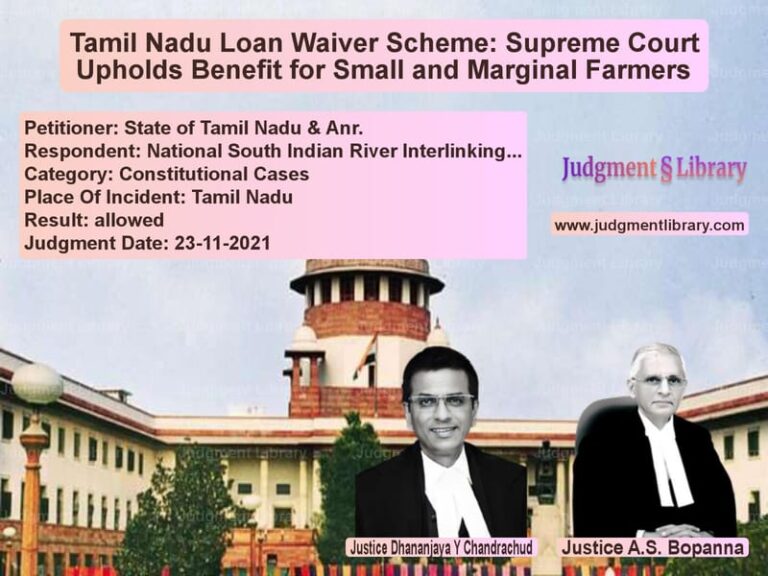Enhanced Compensation for Motor Accident Victims: A Case Study of Kiran’s Family
This appeal arises from the claim made by the family of Kiran, who tragically lost his life in a motor accident on March 30, 2010. The deceased was riding a two-wheeler from Sholapur to Pandharpur in Maharashtra when a Heavy Goods Vehicle collided with his vehicle, causing fatal injuries. The claimants, Kiran’s parents and younger brother, filed a petition seeking compensation for the loss of their loved one. The Motor Accident Claims Tribunal (Tribunal) had awarded compensation, and this decision was appealed to the High Court of Karnataka. The Supreme Court subsequently reviewed the case, considering both the factual circumstances and legal principles surrounding the case. The central issue in this case revolves around the compensation awarded to the family of the deceased, the amount of which was contested by the insurance company.
Petitioner’s Argument
The appellants, represented by the family of the deceased Kiran, contested the amount of compensation awarded by the Tribunal and the High Court. They argued that the compensation granted was insufficient considering the severity of the loss. The petitioners requested that the compensation be recalculated, particularly concerning the deceased’s income and the multiplier used. The appellants pointed out that the income of the deceased, who worked as a T.V. news reporter, should have been considered at a higher rate of Rs. 15,000 per month, as opposed to the Rs. 10,000 taken by the Tribunal. They also pointed out that the multiplier used in the calculation (15) was lower than what was required for the appellant’s age group.
Read also: https://judgmentlibrary.com/enhancement-of-compensation-in-fatal-road-accident-case/
The appellants further argued that the Tribunal and High Court had not accounted for future prospects in the compensation calculation, as per the ruling in the case of National Insurance Company v. Pranay Sethi & Ors. The appellants requested that future prospects be added to the compensation, with a suggested increase of 40%, given the nature of the deceased’s job and the promising future prospects in his career. Furthermore, the claimants pointed out that the compensation awarded under the head of loss of consortium was too low at Rs. 30,000, given the emotional loss suffered by the family. Similarly, they argued that the funeral expenses and loss of estate compensation were inadequate.
Respondent’s Argument
The respondents, represented by the insurance company, opposed the claim for higher compensation. They contended that the amount granted by the Tribunal and the High Court was fair and in line with the legal principles governing compensation in motor accident cases. The insurance company argued that the Tribunal had appropriately considered the income of the deceased at Rs. 10,000 per month, which was reflective of his actual earnings. They further defended the multiplier of 15, stating that it was appropriate for the age of the deceased, who was 25 years old at the time of the accident.
The respondents also argued that the Tribunal had correctly excluded the future prospects of the deceased in the calculation, as the law at the time did not mandate the inclusion of future earnings in compensation claims. They maintained that the Tribunal’s decision on the compensation for loss of consortium, loss of estate, and funeral expenses was within the legal framework and should not be altered. The insurance company, therefore, requested that the appeal be dismissed and the original compensation be upheld.
Court’s Analysis and Ruling
The Supreme Court critically analyzed the arguments presented by both the petitioners and the respondents. The Court first addressed the issue of the deceased’s income, recognizing that the deceased had a significant career ahead of him. The Court agreed with the petitioners that the deceased’s income should have been considered at Rs. 15,000 per month instead of Rs. 10,000. This adjustment reflected the true earning capacity of the deceased, especially considering the nature of his work as a T.V. news reporter. The Court also acknowledged the fact that the deceased was in the early stages of his career and had the potential for future income growth.
The Court then turned its attention to the multiplier used by the Tribunal. Given the age of the deceased (25 years), the Court concluded that the multiplier should have been 18, rather than 15, in line with established legal principles for calculating compensation in such cases. This adjustment increased the total compensation awarded to the family of the deceased.
One of the central issues in this case was the failure of the Tribunal and the High Court to include future prospects in the compensation calculation. Citing the case of National Insurance Company v. Pranay Sethi & Ors., the Supreme Court held that the claimants were entitled to compensation that included future prospects. The Court noted that the deceased had promising future career prospects, and as such, the claimants were entitled to a 40% increase in the compensation to account for future earnings that would have accrued had the deceased survived.
Read also: https://judgmentlibrary.com/supreme-court-enhances-compensation-in-fatal-road-accident-case/
Furthermore, the Court found that the compensation for loss of consortium, loss of estate, and funeral expenses awarded by the High Court were inadequate. The Court increased the amount for loss of consortium to Rs. 75,000, recognizing the emotional toll of losing a loved one. The compensation for funeral expenses and loss of estate was also adjusted to reflect the severity of the loss.
The Court also reviewed the interest rate awarded by the High Court. The High Court had set the interest rate at 6%, but the Supreme Court held that this was too low. The Court modified the interest rate to 7.5% per annum, which was deemed more appropriate given the circumstances of the case and the time taken for the appeal to be resolved.
Conclusion
In conclusion, the Supreme Court allowed the appeal in part, increasing the total compensation awarded to the claimants to Rs. 37,80,000, with interest at 7.5% per annum from the date of the filing of the claim petition. The Court’s decision underscores the importance of considering the future prospects of a deceased person in compensation calculations, particularly when the deceased was young and had a promising career ahead. This judgment provides valuable guidance for future motor accident claims, emphasizing the need for adequate compensation that truly reflects the loss suffered by the family of the deceased.
Petitioner Name: Narayan & Ors..Respondent Name: Manager Royal Sundaram Alliance Insurance Co. Ltd. & Anr..Judgment By: Justice HEMANT GUPTA, Justice SUDHANSHU DHULIA.Place Of Incident: Karnataka.Judgment Date: 22-09-2022.
Don’t miss out on the full details! Download the complete judgment in PDF format below and gain valuable insights instantly!
Download Judgment: narayan-&-ors.-vs-manager-royal-sundar-supreme-court-of-india-judgment-dated-22-09-2022.pdf
Directly Download Judgment: Directly download this Judgment
See all petitions in Compensation Disputes
See all petitions in Motor Vehicle Act
See all petitions in Negligence Claims
See all petitions in Judgment by Hemant Gupta
See all petitions in Judgment by Sudhanshu Dhulia
See all petitions in allowed
See all petitions in supreme court of India judgments September 2022
See all petitions in 2022 judgments
See all posts in Accident Cases Category
See all allowed petitions in Accident Cases Category
See all Dismissed petitions in Accident Cases Category
See all partially allowed petitions in Accident Cases Category







